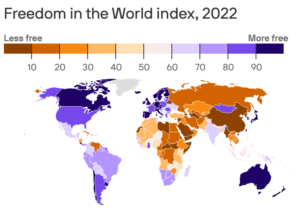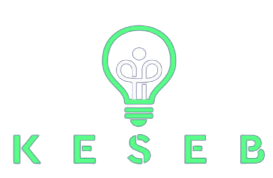Are the authoritarians who grace, or disgrace, our world, from Recep Tayyip Erdoğan to Vladimir Putin, more like or unlike their twentieth-century predecessors?
Two new books, each with virtues of its own, take on the question, The New Yorker’s Adam Gopnik asks:
 [Former National Endowment for Democracy board member] Moisés Naím’s “The Revenge of Power: How Autocrats Are Reinventing Politics for the 21st Century” (St. Martin’s) is a foreign-policy maven’s account of how recent demagogues have come to power and used the tools of our time—social media, television, the society of spectacle—to promote one-man rule and the suppression of dissent. Sergei Guriev and Daniel Treisman’s “Spin Dictators: The Changing Face of Tyranny in the 21st Century” (Princeton) offers a social-scientific perspective on the mechanics of the new autocrats and their common world view. RTWT
[Former National Endowment for Democracy board member] Moisés Naím’s “The Revenge of Power: How Autocrats Are Reinventing Politics for the 21st Century” (St. Martin’s) is a foreign-policy maven’s account of how recent demagogues have come to power and used the tools of our time—social media, television, the society of spectacle—to promote one-man rule and the suppression of dissent. Sergei Guriev and Daniel Treisman’s “Spin Dictators: The Changing Face of Tyranny in the 21st Century” (Princeton) offers a social-scientific perspective on the mechanics of the new autocrats and their common world view. RTWT
Rotten trees
A new Netflix show documentary about the world’s worst dictatorships – How To Become a Tyrant – is accused of “sweeping under the carpet” the crimes of China’s Communist regime.
 Russia is losing its war largely because it’s an autocracy, notes FT analyst Simon Kuper. Even on battlefields democracy helps. Ukraine empowers non-commissioned officers to take decisions on the ground; Russia’s army is as top-down as Russia itself, while Russian arms are as unreliable as their vaccines:
Russia is losing its war largely because it’s an autocracy, notes FT analyst Simon Kuper. Even on battlefields democracy helps. Ukraine empowers non-commissioned officers to take decisions on the ground; Russia’s army is as top-down as Russia itself, while Russian arms are as unreliable as their vaccines:
It also turns out that autocracies don’t think long-term: Chinese carbon emissions more than tripled in three decades and now exceed those of all developed countries combined. The crisis of autocracy stems partly from a lack of corrective mechanisms, especially since Xi Jinping, Putin and Erdoğan removed legal limits on their own powers…. Since 2020, authoritarian states have given the world disease, war and now hunger. Looking ahead, their overthrow could spread violence and anarchy. These systems are like rotten trees, forever threatening to topple on to our better-kept houses.
It is easy to be pessimistic about the future of democracy, notes The Wall Street Journal’s Gerald F. Seib. Yet there is another, more optimistic way to look at the landscape – one that shows considerable resilience. The genius of democracy is that it isn’t static. It adjusts and adapts over time to changing circumstances. It renews itself.
Defending against authoritarianism
 Citizens of both established democracies and the world’s most repressive regimes have become less free in recent years, with 8 in 10 people living in “Partly Free” or “Not Free” countries, according to Freedom House. While democratic Ukraine’s fierce resistance has galvanized a steadfast international response, efforts by democracy champions to turn the tide on authoritarianism and build inclusive, multigroup democracy remain siloed—segmented by national boundaries.
Citizens of both established democracies and the world’s most repressive regimes have become less free in recent years, with 8 in 10 people living in “Partly Free” or “Not Free” countries, according to Freedom House. While democratic Ukraine’s fierce resistance has galvanized a steadfast international response, efforts by democracy champions to turn the tide on authoritarianism and build inclusive, multigroup democracy remain siloed—segmented by national boundaries.
Keseb, a new global nonpartisan nonprofit organization, and the SNF Agora Institute at Johns Hopkins University have partnered to host the inaugural Virtual Global Democracy Champions Summit. The summit will create a forum for democracy entrepreneurs, activists, academics, journalists, philanthropists, and policy makers to uplift compelling ideas, share insights across national boundaries, and create a global network of activists and civil society leaders committed to building inclusive, 21st century democracies.
 Sessions will include: the state of global democracy; battling the effects of conspiracy theory and disinformation; building enduring people power; imagining a co-governance model; entrepreneurship as a vehicle for building inclusive and multigroup democracies; and the global youth movement for democracy.
Sessions will include: the state of global democracy; battling the effects of conspiracy theory and disinformation; building enduring people power; imagining a co-governance model; entrepreneurship as a vehicle for building inclusive and multigroup democracies; and the global youth movement for democracy.
Speakers include:
- Tareq Alani, Chief Product Officer, PushBlack
- Anne Applebaum, Senior Fellow, SAIS & the SNF Agora Institute; Staff Writer, The Atlantic
- Ian Bassin, Co-Founder and Executive Director, Protect Democracy
- Jagdeep Chhokar, Founding Member and Trustee, Association for Democratic Reforms
- Akunna Cook, Deputy Asst Secretary, Bureau of African Affairs, U.S. Department of State
 Hahrie Han, Inaugural Director of the SNF Agora Institute, P3 Research Lab at JHU
Hahrie Han, Inaugural Director of the SNF Agora Institute, P3 Research Lab at JHU- Gabriel Marmentini, Co-Founder and Executive Director, Politize!
- Koketso Moeti, Founding Executive Director, amandla mobi
- Tulaine Montgomery, Co-CEO, New Profit
- Yascha Mounk, Associate Professor, SAIS and SNF Agora
- Farida Nabourema, Executive Director of the Togolese Civil League
- Nick Penniman, Founder and CEO, Issue One
- Salil Shetty, Vice President, Global Programs, Open Society Foundations
- Lisa Witter, CEO, Apolitical Foundation
- Uzra Zeya, Under Secretary of State for Civilian Security, Democracy, and Human Rights
9 June 2022 – 10 June 2022 09:00 – 15:00 RSVP







